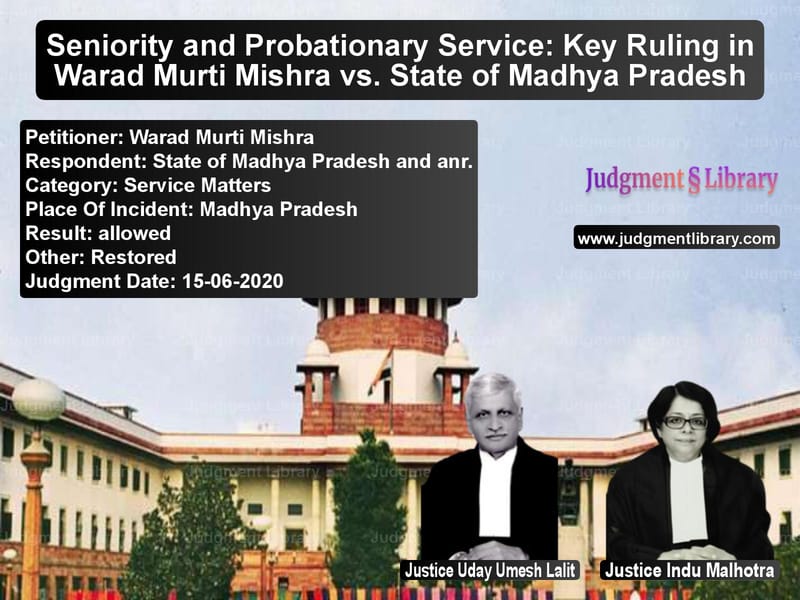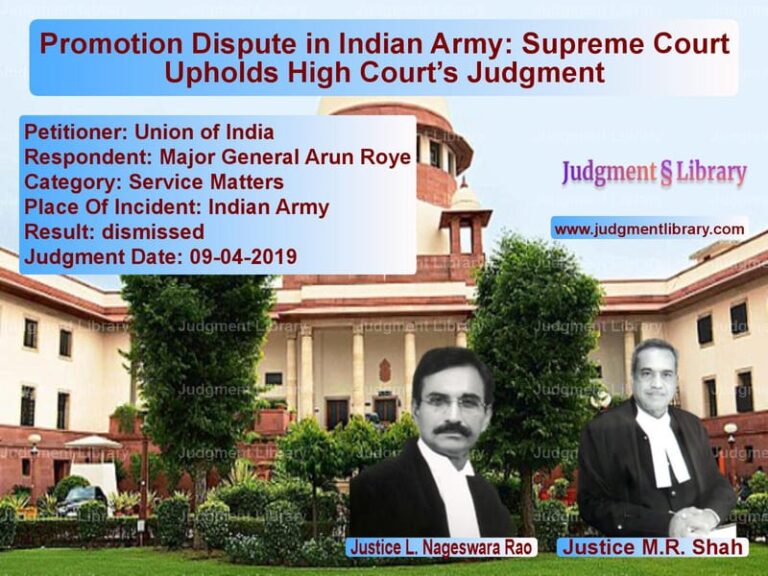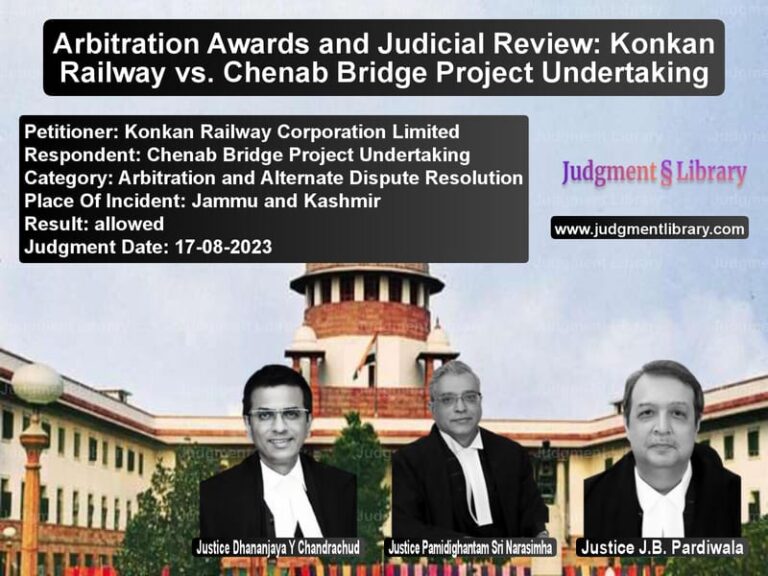Seniority and Probationary Service: Key Ruling in Warad Murti Mishra vs. State of Madhya Pradesh
The case of Warad Murti Mishra vs. State of Madhya Pradesh and anr. is a significant ruling by the Supreme Court of India concerning the seniority of government employees, probation, and the interpretation of the Madhya Pradesh Civil Services (General Conditions of Service) Rules, 1961. The case revolves around whether employees who could not clear the departmental examination within the specified probation period, but completed it within the extended probation period, should rank senior to those selected in subsequent selection processes.
The dispute arose from the seniority of employees who were initially appointed on probation but failed to pass the departmental examination within the two-year period of probation. However, they eventually cleared the examination during the extended period and were confirmed in their positions. The question at issue was whether these employees should retain their seniority or if they should be ranked lower than those who cleared the examination within the stipulated period and were confirmed earlier.
Background of the Case
The appellant, Warad Murti Mishra, joined the Madhya Pradesh Administrative Service as a Deputy Collector on July 1, 1996, after being selected by the Madhya Pradesh Public Service Commission. He was placed on probation for two years, within which he was required to clear a departmental examination. The rules stipulate that probation can be extended by one year, and the examination must be cleared within the extended period. Mishra cleared the examination on January 28, 2001, which was more than three years after his initial appointment.
The issue at hand was whether the appellant, along with similarly situated individuals, should rank senior to those appointed in subsequent selection processes, who cleared the examination within the stipulated period. The Madhya Pradesh Civil Services (General Conditions of Service) Rules, 1961 and the Madhya Pradesh State Administrative Service (Executive) Rules, 1975 were central to the case. These rules provided the framework for probation, departmental examination, and seniority, specifically addressing how seniority should be calculated in cases where probation was extended and the examination was cleared after the extended period.
Legal Provisions and Key Issues
The case primarily involved the following legal provisions:
- Rule 8 of the Madhya Pradesh Civil Services (General Conditions of Service) Rules, 1961: This rule addresses probation, including the maximum period of probation and the requirement to clear the departmental examination during probation.
- Rule 12(1)(a) of the Madhya Pradesh Civil Services Rules, 1961: This rule pertains to the seniority of direct recruits, determining that seniority is based on the order of merit in which individuals are recommended for appointment, irrespective of the date of joining.
- Rule 13(7) of the Madhya Pradesh State Administrative Service (Executive) Rules, 1975: This rule discusses the status of probationers who fail to clear the departmental examination within the probationary period and the consequences of such failure, including their deemed status as temporary government servants.
The Supreme Court had to determine:
- Whether the appellant and similarly situated persons should retain their original seniority, despite not clearing the departmental examination within the initial probation period.
- Whether the extension of probation for failure to clear the examination affects seniority.
- Whether employees who clear the departmental examination during the extended period of probation should rank below those selected in subsequent processes.
Arguments of the Petitioner
The petitioner, Warad Murti Mishra, presented the following arguments:
- The appellant’s failure to clear the examination within the initial probation period was not due to any fault on his part, and he should not be penalized by losing seniority.
- As per the rules, the seniority should be based on the order of merit and not solely on the time taken to pass the examination.
- The appellant and others in similar positions should be treated as senior to those selected in subsequent processes, as they were originally appointed through the same selection process.
- The extension of probation was in accordance with the rules, and there was no violation of the process or any act of indiscipline on the part of the appellant.
Arguments of the Respondent
The respondent, State of Madhya Pradesh, presented the following arguments:
- Employees who failed to clear the departmental examination within the prescribed probation period should not retain their original seniority, as their failure to pass within the time limit signifies a lack of suitability.
- Those who cleared the examination within the stipulated period should rank senior to those who failed to do so.
- The seniority of employees who had their probation extended for failing to clear the examination should be fixed from the date they cleared the examination, and they should not be allowed to retain the same seniority as those who cleared the examination within the probationary period.
Judgment of the Supreme Court
The Supreme Court analyzed the relevant legal provisions and previous judgments before delivering its verdict. The key findings of the Court were:
- The Court affirmed that the seniority of employees should be determined based on the order of merit in which they were selected, and not merely the date of joining.
- The extension of probation should not automatically result in a loss of seniority, provided the employee clears the examination within a reasonable time frame after the extension.
- The appellant and others in similar positions should not be placed at a disadvantage simply because they were unable to clear the examination within the initial probation period.
- The Court held that the appellant and others who were delayed due to factors beyond their control should retain their seniority as per the order of merit in the selection process.
Accordingly, the Supreme Court allowed the appeal, upheld the seniority of the appellant, and clarified that employees who cleared the examination after the extended period should retain their seniority from the date of appointment.
Impact of the Judgment
This ruling has significant implications for the seniority of probationary employees in government services:
- It clarifies that probationary employees who fail to clear the examination within the initial period should not be penalized by losing seniority.
- It ensures that seniority is determined based on the order of merit in the selection process, not solely on the time taken to pass the departmental examination.
- It provides a clear framework for the treatment of employees whose probation period is extended due to failure to clear the examination, ensuring that they are not unfairly disadvantaged.
- It sets a precedent for future cases involving the seniority of probationers and their right to rank senior to employees selected in subsequent processes.
Conclusion
The judgment in Warad Murti Mishra vs. State of Madhya Pradesh provides clarity on the interpretation of seniority rules for probationary employees in government service. The Supreme Court reaffirmed the principles of fairness and merit, ensuring that probationary employees who failed to pass their departmental examination within the prescribed period are not unfairly penalized by losing their seniority. This ruling ensures consistency in the treatment of probationary employees and will serve as a key reference for future cases regarding seniority and probationary service.
By reinforcing the importance of merit and equity in determining seniority, the Court has ensured that government employees are treated fairly in the context of their careers and professional growth.
Petitioner Name: Warad Murti Mishra.Respondent Name: State of Madhya Pradesh and anr..Judgment By: Justice Uday Umesh Lalit, Justice Indu Malhotra.Place Of Incident: Madhya Pradesh.Judgment Date: 15-06-2020.
Don’t miss out on the full details! Download the complete judgment in PDF format below and gain valuable insights instantly!
Download Judgment: Warad Murti Mishra vs State of Madhya Prad Supreme Court of India Judgment Dated 15-06-2020.pdf
Direct Downlaod Judgment: Direct downlaod this Judgment
See all petitions in Employment Disputes
See all petitions in Promotion Cases
See all petitions in Public Sector Employees
See all petitions in Judgment by Uday Umesh Lalit
See all petitions in Judgment by Indu Malhotra
See all petitions in allowed
See all petitions in Restored
See all petitions in supreme court of India judgments June 2020
See all petitions in 2020 judgments
See all posts in Service Matters Category
See all allowed petitions in Service Matters Category
See all Dismissed petitions in Service Matters Category
See all partially allowed petitions in Service Matters Category







